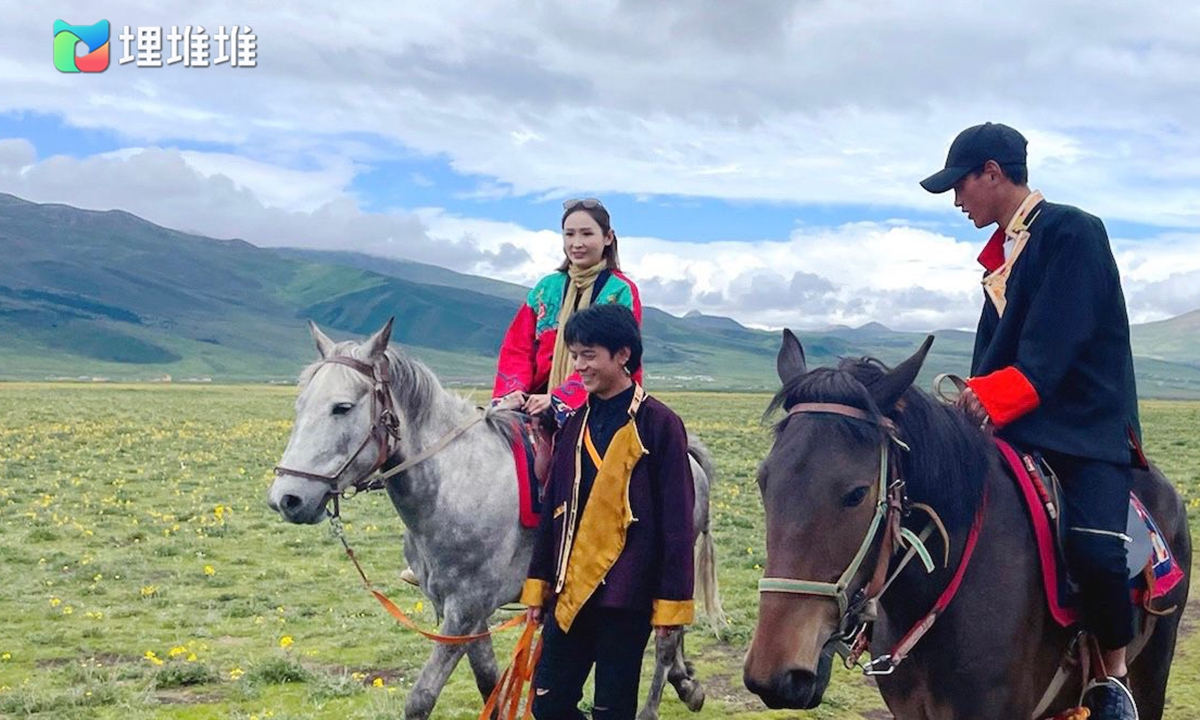ARTS / TV
Hong Kong documentary ‘No Poverty Land’ seen as textbook by parents and schools
Window to the motherland

Promotional material for No Poverty Land Photos: Courtesy of TVB

Promotional material for No Poverty Land Photos: Courtesy of TVB
A Hong Kong TV production team spent three months filming at 10 locations in the Chinese mainland to introduce the regions' poverty alleviation efforts to the city's residents.Reviews from viewers, both in the mainland and in Hong Kong, show that they have achieved success.
The documentary No Poverty Land is being seen by parents and schools in Hong Kong as a window to help young people to learn more about the mainland. The series currently has a 9.5/10 on major Chinese media review platform Douban.
Janis Chan, the Hong Kong Television Broadcasts Limited (TVB) host who acts as a guide for audiences in the documentary, talked with the Global Times about the production of the documentary and why she thinks the program has been so successful.
"I was invited to Hong Kong University to give a speech and communicate with students how our motherland is developing. I am glad to see parents and schools treating the documentary as a textbook and playing it for children, which can deepen their understanding of the motherland," Chan noted.
Sustainable efforts
The 12-episode documentary series aired on TVB from August 21 to November 6.
The production team selected what they felt were the 10 most representative cases of deep poverty in Southwest and Northwest China, and analyzed the different poverty alleviation methods adopted by each place, including population relocation, promoting regional development through industry and developing education.
By comparing the present and the past, the program recalls the harsh living conditions of the past and shows that today's happy life was not easily earned.
The idea of producing such a program started from a journey in 2019.
Wong Suk-ming, director of TVB's news department, and her colleague went to Southwest China's Guizhou Province and Northwest China's Ningxia Hui Autonomous Region in 2019. They were surprised by how much places they remembered as being extremely poor had changed.
There are now well-built transportation networks, developed infrastructure and an advanced data center for technology with clients around the world.
Wong was shocked by the development of the mainland and decided to film a documentary to tell these poverty alleviation stories to Hong Kong citizens.
Chan said that except for this journey, she and the production team had not been to these rural areas before filming the program. She searched information online to prepare for the documentary, but what she really experienced on the scene has still impacted her and given her so deep impression.
When talking about the most impressive places, Chan listed the Garze Tibetan Autonomous Prefecture in Sichuan Province and Atulie'er village, also known as "the cliff village," in Liangshan Yi Autonomous Prefecture, also in Sichuan.
Due to the village's isolated location, perched like the seat of a chair with near-vertical cliffs both above and below, villagers had to use a series of handmade ladders to scale the 800-meter-high cliff. Now a 2,556-step steel staircase has been built, significantly improving travel for locals.
Chan also climbed the steel staircase with villagers, filming the entire journey for audiences even though she was trembling the entire time.
After seeing the poor conditions in the village, Chan was taken by villagers to their new homes, modern buildings built at the base of the mountain so they can enjoy a normal life.
The distinct difference between their former and new homes made Chan excited and happy for these villagers.
Local poverty alleviation programs have not only built homes for residents but have also trained them and helped establish industries suited to local conditions, including selling agricultural products through livestreams.
The importance of education was not forgotten during these efforts of these villagers, who also spent time and money improving schools for local children.
"Before alleviating poverty, we should foster people's wisdom," Chan said, noting that improving education is a significant part of poverty relief.
She said that she feels poverty alleviation in the Chinese mainland is a sustainable process as it relies on technology and knowledge, and that villages will not return to previous conditions as some foreign media speculate.
Secret to success
During the more than two months the show was airing, it's word of mouth continued to rise both in the Chinese mainland and in the Hong Kong Special Administrative Region.
"This poverty alleviation documentary is one that audiences can easily relate to," write many reviews.
Chan said that the most important thing when capturing audiences' attention is to communicate with local people with heart, feeling what they feel and thinking what they think.
"I have been so curious about others' stories since I was a child and my parents often consider me as a gossip," Chan laughed.
"I think the interviewee can feel my longing to become friends with them."
Chan has received many positive feedback from audiences after the program was released and her friends came to ask her how to take a tour of the mainland to appreciate these marvelous locations.
"I want to organize a tour group for them named 'No Poverty Land' and bring them to where I visited, letting them step on the steel staircases, taste coffee made in Yunnan Province and slip through the iron chain on the Nujiang River," Chan said.




